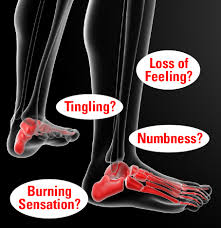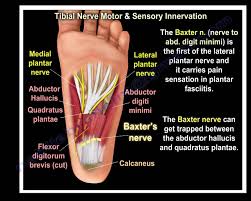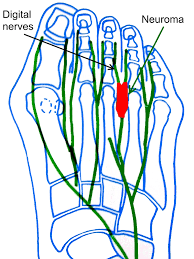Our human feet have the most concentrated group of nerves in our body. So when we walk, our bare feet have a natural desire to feel what's going on It allows them to adjust to different surface conditions on a moment-by-moment basis.



When we wear cushioned shoes, though, it reduces the ability of our feet to sense what's happening beneath them soles. We'll therefore automatically hit the ground extra hard with each step just to compensate for not feeling the ground directly.
Here's how the problem was explained by orthopedic surgeon Joseph Froncioni in the pivotal article that confirmed to Michael Sandler that taking his shoes off would speed his injury recovery:

The body system respond by landing harder in an attempt to compress the cushion and "feel" the ground.
The repeated high impact from walking/running in shoes creates terrible stress on our ankles, knees, legs and hips. The cumulative effect of these micro traumas to which we subject our bodies leads to stress fractures, plantar fasciitis, bunions, and a variety of other ailments of the knees and back that can sideline casual and avid walkers alike.

1. Drive one knee and opposite elbow forward. Keep back straight.
2. Imagine stepping over a log. The faster your pace, the bigger the log.
3. Ankle should never extend in front of the knee.
4. Knee drive comes from hips and glutes; the rest of the leg hangs relax.
5. Position foot for gliding approach. Forefoot will strike the ground first.

6. Heel touches down gently after forefoot. As soon as foot touches down, begin cycle with opposite leg.


When we wear cushioned shoes, though, it reduces the ability of our feet to sense what's happening beneath them soles. We'll therefore automatically hit the ground extra hard with each step just to compensate for not feeling the ground directly.
Here's how the problem was explained by orthopedic surgeon Joseph Froncioni in the pivotal article that confirmed to Michael Sandler that taking his shoes off would speed his injury recovery:
The body system respond by landing harder in an attempt to compress the cushion and "feel" the ground.
The repeated high impact from walking/running in shoes creates terrible stress on our ankles, knees, legs and hips. The cumulative effect of these micro traumas to which we subject our bodies leads to stress fractures, plantar fasciitis, bunions, and a variety of other ailments of the knees and back that can sideline casual and avid walkers alike.
1. Drive one knee and opposite elbow forward. Keep back straight.
2. Imagine stepping over a log. The faster your pace, the bigger the log.
3. Ankle should never extend in front of the knee.
4. Knee drive comes from hips and glutes; the rest of the leg hangs relax.
5. Position foot for gliding approach. Forefoot will strike the ground first.
6. Heel touches down gently after forefoot. As soon as foot touches down, begin cycle with opposite leg.

No comments:
Post a Comment